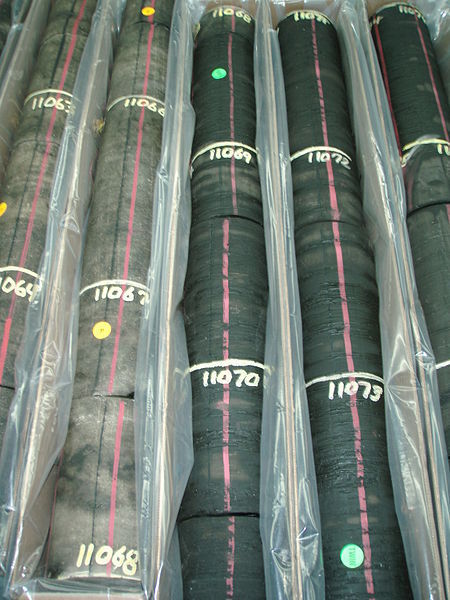- News
- News / Politics And Administration
- News / Politics And Administration / Campus
- News / Politics And Administration / City
- News / Politics And Administration / State
Bakken pipeline committee comes to Boone

North Dakota Bakken core in 2012.
November 11, 2015
Crude oil may soon be running from North Dakota to Illinois under the feet of thousands of Iowa residents.
The effects of the proposed Bakken crude oil pipeline, which would run through ISU property, will be discussed Thursday in an Iowa Utilities Board hearing in Boone.
“We don’t have a pipeline for crude oil in Iowa like they do in Nebraska or South Dakota, so this is a new category for us,” said David Swenson, associate scientist in economics and agriculture and life sciences.
Swenson said the pipeline could bring some benefits to Iowa if approved, but there are also drawbacks. While economically efficient, the pipeline would hurt long-term jobs, he said.
“The pipeline doesn’t add much productivity to Iowa,” Swenson said. “It doesn’t add anything over a long period of time in the Iowa economy.”
The Bakken pipeline is being proposed by the Energy Transfer Crude Oil Company, and is also known as the Dakota Access Pipeline.
Geri Huser, chairwoman, Elizabeth Jacobs and Nick Wagner were appointed by Gov. Terry Branstad to hear concerns and opinions of Iowans. They make up the Iowa Utilities Board.
Once the two Bakken pipeline hearings end, the Iowa Utilities Board will make a decision on whether to approve the pipeline going through state-owned land.
Warren Madden, senior vice president of business and finance, said the Iowa Board of Regents would then have to decide whether to allow the pipeline to go through ISU property.
“The land that’s involved in this right now is a dairy farm,” he said. “[The land] the pipe would run under is used to grow crops.”
The pipeline would be buried a minimum of 4 feet underground, or at least 2 feet under any tile lines, he said.
Energy Transfer may try to use eminent domain as a way to be permitted to build the Bakken pipeline on state land.
Cornell University Law School defines eminent domain as “the power of the government to take private property and convert it to public use.” The government must then compensate landowners justly, in accordance with the Fifth Amendment.
In the case of the oil pipeline, the state of Iowa would compensate landowners in return for their properties. The land would then be sold by the state to Energy Transfer, so the company could build the pipeline.
“There is ongoing debate over safety concerns,” Madden said.
Currently, oil moves through Iowa State via the Union Pacific Railroad. Madden said the risk of a train accident resulting in an oil spill is probably higher than if the Bakken pipeline was moving oil through the area.
“[Energy Transfer] will reimburse Iowa State for any crop losses during construction and going forward,” Madden said.
Thursday’s hearing will feature 280 commenters who signed up to present their opinions and concerns.
Swenson said he is neutral about the pipeline construction. Madden said groups and individuals are for and against the pipeline for various reasons.
“There’s a trade-off,” Swenson said. “There’s a decrease in train accidents versus a rupture in the pipeline and the environment degrading.”
The Iowa Utilities Board hearing on the Bakken crude oil pipeline will take place from 9 a.m. to 5 p.m. Thursday at the Boone County Fairgrounds Community Building, 1601 Industrial Park Rd.
A second hearing will take place from 9 a.m. to 5 p.m. Monday at the Community Building for evidence and cross-examination of information by the Iowa Utilities Board.
For more information, visit the websites for the Iowa Utilities Board or Energy Transfer.
IUB website: https://iub.iowa.gov/
Energy Transfer Co. website: http://www.energytransfer.com/






